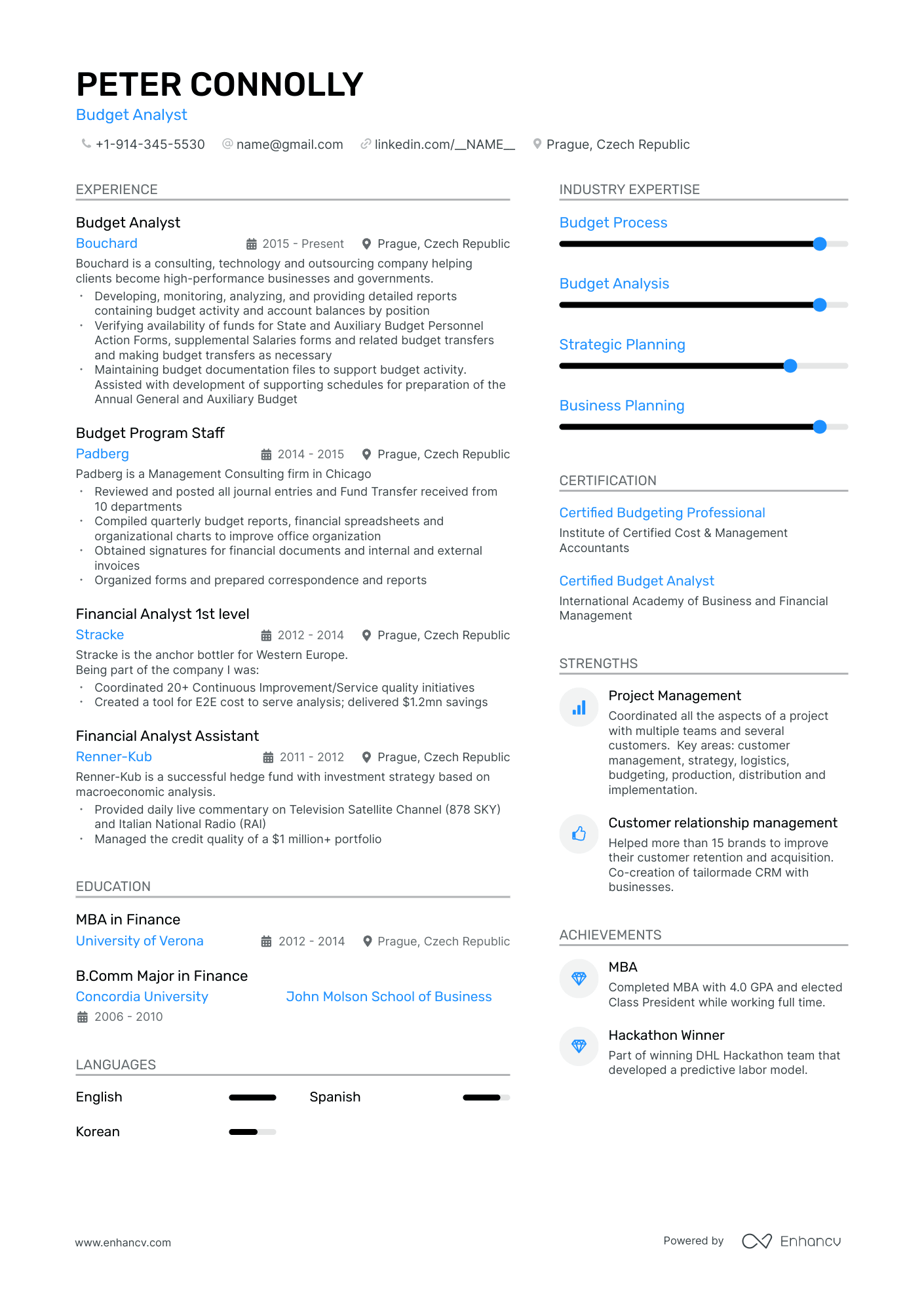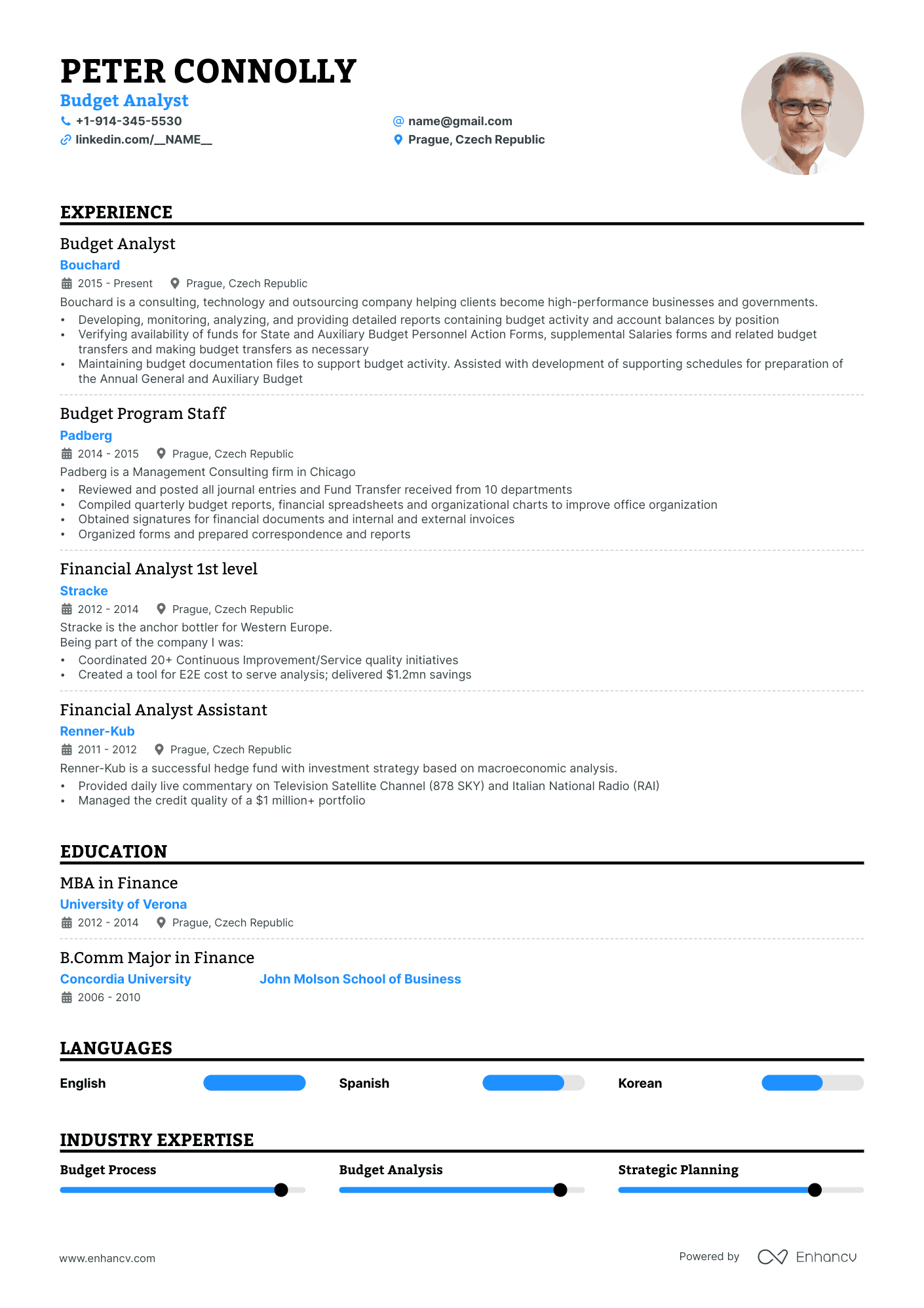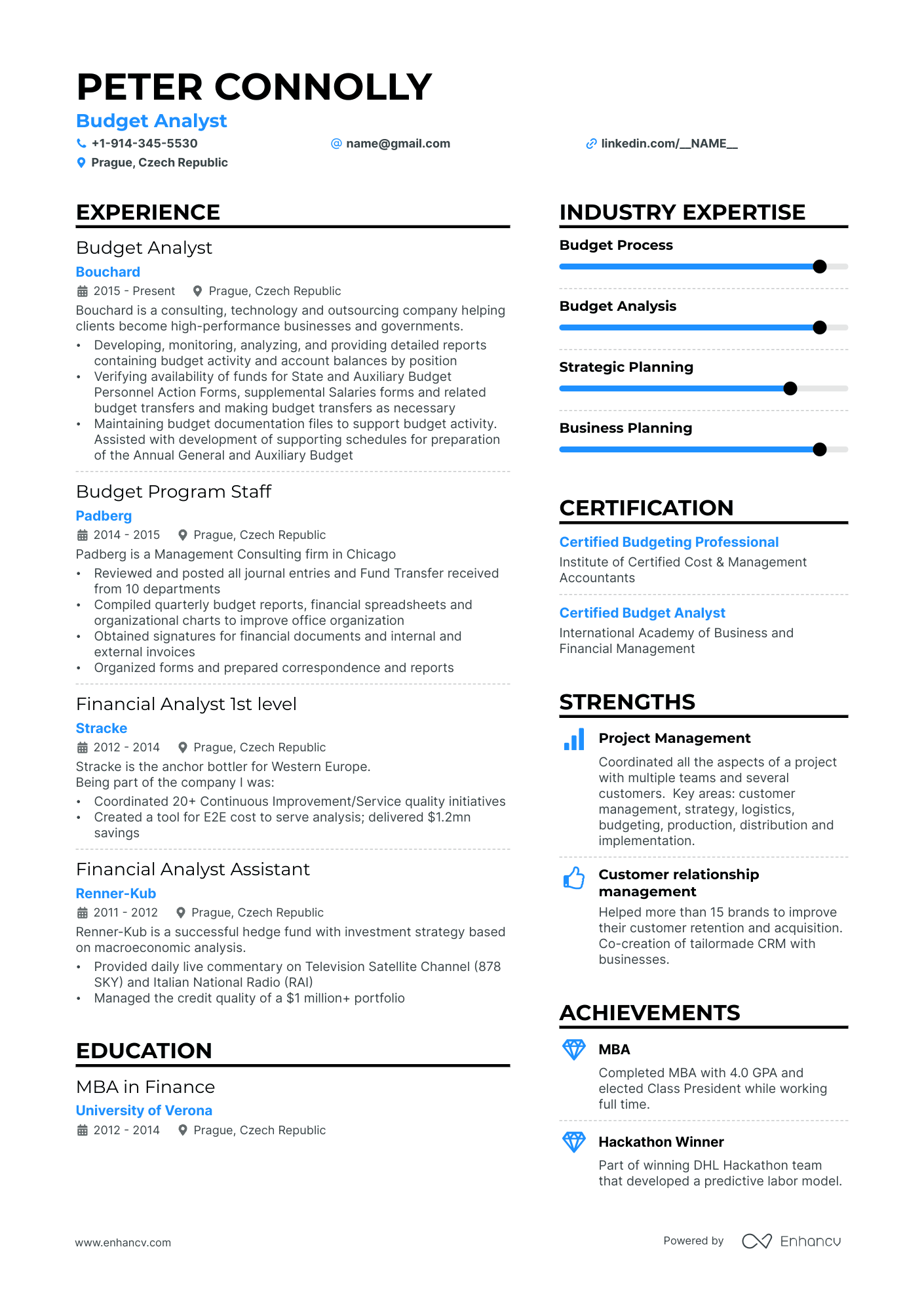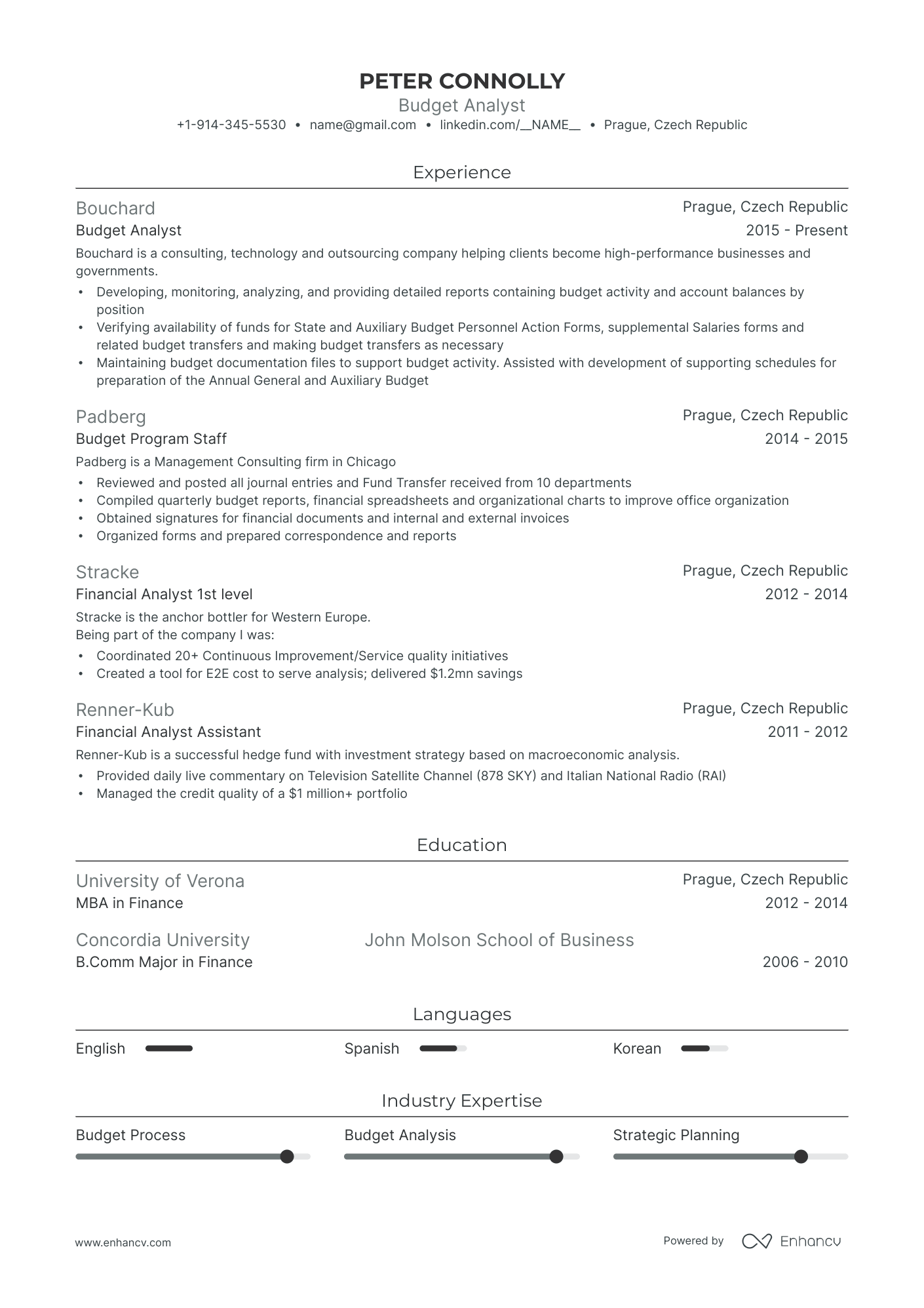Imagine business without budget analysts. I mean, sure there are financial analysts and accountants that work with numbers, but the former is a jack-of-all-trades while the latter is focussed on bookkeeping and tax returns. Neither does what you do—assessing whether performance is in line with the established budget.
Without budget analysts, there would be no annual budgets or long-term budget forecast. Businesses would be a mess.
They also know that the budget analyst they choose is integral to the future success of the organization.
Luckily, you are around. And companies know your worth. So let’s dive into how to make that shine on your budget analyst resume.
In this guide, we’ll show you how to write a budget analyst resume that makes employers sit up and take notice.
If you're doing good analysis of how things cost out, you have influence. For the right person -- one who's comfortable with numbers -- it's a great way to be a contributor..
Scott Pattison, Executive Director of the National Association of State Budget Officers
This budget analyst resume guide will teach you:
- 6+ information budget analyst resume samples and examples to inspire your own budget analyst resume.
- How to write a budget analyst resume header that proves you are a serious candidate.
- How to write a budget analyst professional summary that makes a great first impression.
- How to explain your budget analyst resume experience and achievements.
- Which skills and certifications to add to your budget analyst resume to give you an edge over the competition.
Looking for related resumes?
- Financial analyst resumes
- Business analyst resumes
- Investment banking analyst resumes
- Finance resumes
- Accounting resumes
How to write a powerful budget analyst resume
The difference between a budget analyst resume that gets trashed and one that gets the candidate an interview is simple: the latter shows hiring managers want they want to see.
And what they want to see is a candidate who has the right mix of qualifications (in your case, a bachelor’s degree in finance, accounting or mathematics), skills in industry tools such as SAS and Tableau, and experience performing budget modelling and measuring KPIs. And all this needs to be explained in detail.
By ‘detail,’ we don’t mean writing an essay to go with each job you’ve had or course you’ve taken.
We mean, using the right language – specific words and phrases that show you know what you’re doing.
For example, hiring managers aren’t looking for candidates with any kind of degree. They want a bachelor in accounting, finance, economics, or statistics.
They don’t want someone who's good with reporting software. They want someone with a working knowledge of:
- Math
- Financial forecasts
- Spending projections
- Financial coding
- Reconciliation
- MS Access
- SAP
- IBM Cognos
Getting specific is what gives a resume the edge. It also gets you past the first hurdle: recruiters.
Recruiters are trained to look for finance and budget-related keywords that match what the employer is looking for.
Name dropping tools and skills such as FP&A and problem sensitivity throughout your budget analyst resume will help you pass the keyword test.
For an idea of the keywords a recruiter is looking for, check the budget analyst job description. They’re all there.
For instance, if a job poster asks for knowledge of extramural funds, a recruiter will be looking for any mention of that term.
Here's what a recruiter will look for in your budget analyst resume:
- Your budget and finance-related qualifications
- Your experience as a budget analyst (where you’ve worked, what you’ve worked on, and how you’ve made a difference by maintaining balanced budgets)
- Your job-related skills, including which accounting software, financial systems, and databases you’re familiar with
- Your interpersonal skills, particularly your ability to solve complex problems and make good decisions
- Any job-relevant budget analyst certifications that you have
The most important sections of a budget analyst resume:
- Professional summary
- Budget analyst experience
- Education
- Technical skills
- Budgeting, analysis, and finance-related certifications
- Budget analyst projects
- Soft skills
You’re the best budget analyst for the job. You know it. We know it. Make sure recruiters and hiring managers know it. Shout about your qualities at every opportunity.
You’re probably underestimating the importance of your budget analyst resume header
How important can the header of a budget analyst resume really be? I mean, all it includes is your contact details and none of those can get you hired, right?
Maybe not. But they are the hiring manager’s first impression of you.
How your resume header appears tells the reader a lot about how serious of a candidate you are.
Take a look at the below example:
The basics are there, but it’s lacking any kind of “oomph.” Let’s look at the same header again, this time with a few tweaks:
All we’ve done is added a qualification and link, but now it has "oomph". Most candidates never consider this for a header.
Those simple tweaks transform your first impression as a budget analyst. They turn an “average Joe” into a serious, qualified candidate who’s ready to show what they can do.
Take your budget analyst resume header to the next level by linking to your LinkedIn profile
Adding a LinkedIn profile to your header works to extend your resume. You’re giving the hiring manager a more complete picture of you, and deeper look at what you’ve done and can do.
It also shows them you’re out there networking and sharing content within your community.
In a field like budget analysis that constantly strives to become more efficient, sharing ideas and insight shows that you’re keen to stay ahead of the curve.
If you have a personal website or other professional social media networks, add those to your resume header too. They can only help strengthen your budget analyst application.
Grab the hiring manager’s attention with a hard-hitting budget analyst professional summary
A great header will pique the interest of a hiring manager. A great professional summary will have them giving you their full attention.
This is your elevator pitch. Your 30-second slot to convince the reader why they should hire you and not the next budget analyst on the list.
Your professional summary does three things:
- Sell your skills and experience as a budget analyst.
- Show your passion for the job.
- Convince the reader to find out more.
Being a budget analyst isn’t just about numbers and spreadsheets—you’re an expert in projections, financial reconciliation, and a number of technical software applications beyond Excel.
Here’s your chance to let that shine!
With those three things in mind, take a look at the following example:
- Does it sell the candidate’s skills and experience? Not really.
- Does it show a passion for budget analysis? Nope.
- Does it convince the reader to find out more? They’ve probably stopped reading.
Let’s take that vague introduction and give it some of that “oomph” we sprinkled on the header:
- Does it sell the candidate’s skills and experience? Yeah.
- Does it show passion for the job? It sure does. It’s upbeat and enthusiastic.
- Does it convince the reader to find out more? With the mention of a global nonprofit and the name-dropping of much-needed skills, it’s created a more intrigue than a Stephen King novel.
The second example ticks all the boxes.
But what if you’re looking for an entry-level budget analyst role? What if you don’t have the skills or experience to wow the reader?
Make your pitch count by leading with your financial qualifications.
With this example, experience and skills have become irrelevant. The candidate is showing they have the right education and the passion to succeed. Those things—combined with the fact that the summary oozes professionalism—tells the reader that this is a candidate to consider.
Pro tip
Keep your budget analyst professional summary concise (less than 60 words). This is a highlight real of your best bits that should take up no more than 30 seconds of the reader’s time. Choose every word carefully.
How should you frame your budget analyst resume experience?
Every budget analyst job above entry-level will ask for at least one year of experience. Some high-end government roles require up to five years of work history.
Because of this, hiring managers are naturally drawn to the experience section. Which means you have to make it count.
The best way to frame your budget analyst experience is to think of it like another mini sales pitch. You have to give the reader what they want to see.
In your case, budget analyst recruiters are looking for:
- The company you worked for
- Your role within the company
- Which skills and tools you used in the role (remember, they’ll be looking for keywords. If you’ve worked with Hyperion or XL Reporting, mention them by name)
- How you used your financial, statistical and analytical knowledge to help the company balance budgets to stay on track with their finances
How you present this information helps determine whether you land an interview.
Let’s look at a couple of examples…
2 budget analyst resume experience samples
A quick tangent. You’ll notice that each of the examples use bullet points to list budget analysis duties and accomplishments. There’s a good reason for this…
Recruiters like to skim read. They want to consume the key information with little effort.
Bullet points are the best way to present details in a way that’s easy to digest.
Okay, on with the examples. Starting, as ever, with how not to do things.
- •Assisted in the evaluation of budgetary health for various projects.
- •Prepared and presented project spending analysis reports.
- •Prepared and edited justification of budget revisions and forecasted expenditures.
- •Maintained and developed detailed cost tracking.
We’re seeing duties here, but that’s all. It’s run of the mill.
There’s nothing for the reader to get excited about.
You want hiring managers to read this section and immediately get in touch about an interview.
You need to show that you love budgeting, forecasting, and finance generally; that you’d be an asset to any company you worked for. Remember, you’re not just an Excel spreadsheet monkey!
Let’s take those very same budget analyst duties and add some specificity.
- •Worked to develop a deep knowledge of projects to assist in evaluating budget health using Microsoft Excel.
- •Used MS Access to create project spending analysis reports and presented them to company directors with PowerPoint presentations.
- •Worked closely with project managers to prepare and edit justification of budget revisions and forecasted expenditures for clients.
- •Maintained and developed detailed cost tracking and forecasting templates using IBM Planning & Analysis, reducing wasted spend by $175k.
Now the reader is looking at a candidate who isn’t simply there to pick up a paycheck.
They’re seeing a skilled professional who has created financial spreadsheets, built reports, and put measures in place to maximize a company’s budget.
They’re seeing someone who can come in and improve the organization’s financial wellbeing.
Make a positive statement with every bullet point. Use proactive language, be specific, and use numbers to quantify achievements.
How to describe the duties of a budget analyst on a resume
If you’re struggling to come up with duties to add to your budget analyst resume, here are some sample work experience responsibilities for inspiration:
- Worked with [ABC] teams to develop financial strategies and cost containment programs.
- Carried out the daily management and control of the company’s $X expense budget, including undertaking internal and externally required studies.
- Prepared, examined, and analyzed accounting records using [name of software].
- Created periodic reports using [insert software] to compare budgeted revenues and expenses to actual spend.
- Coordinated and liaised with [name of department] on all budget-related issues, including system improvements and security, communications, and troubleshooting.
- Conducted accounting and financial work assignments in compliance with X standard practices.
If you’re looking for an entry-level budget analyst role, you can make up for a lack of experience by focusing on your knowledge and skills:
- Talk about your knowledge of budget analysis tools and databases (i.e. MS Access, Sharepoint, and ERP software).
- Explain your proficiency in Financial Planning & Analysis.
- Talk about any school, personal, or volunteer projects that highlight your skillset. For example, if you’ve worked as a volunteer analyzing the accounts of a local charity, talk about what you did and how you made a difference.
- Discuss examples of times you’ve performed mathematical reasoning, number facilitation, and problem sensitivity.
Does your budget analyst resume need an education section?
Education section on a budget analyst resume is a MUST.
While it’s possible to find budget analyst entry-level roles without experience, you won’t find a position that takes on candidates without a qualification.
For budget analysis, you’ll need a bachelor’s in finance or accounting, or a related area such as economics, business, or statistics.
How you should present your degree on your resume depends on your work experience. If you’ve worked in budget analysis for three or more years, the education section can be as brief as:
- Degree
- Place of study
- Year of graduation
Add in any specialized courses or training in the description that may help your education section stand out. Let’s face it, many candidates will have financial-related degrees and certifications.
But, many may not have the specific course experience you do. If you have less than three years of professional experience on your budget analysis resume, list…
- Your highest degree
- GPA (if higher than a 3.0)
- Class honors or rewards
- Any completed job-related courses
Which skills do employers look for in a budget analyst resume?
In a job like budget analysis that involves getting hands-on with data and numbers, technical skills are essential.
Hiring managers want to see working knowledge of reporting and analysis tools, along with strong analytical skills.
But budget analysts need soft skills too. Those that show you can solve problems, communicate findings, and work well with others.
Your research will include not only crunching numbers, but also reading, writing and tactfully presenting program evaluations. "There's a lot of written material you have to grasp, and programs are complicated in terms of how they operate," Mullen says. "You have to manage multiple tasks and work as a responsible and amiable team member, not only in your office, but also with others outside your office.
Patrick Mullen, Senior Analyst, Government Accountability Office (GAO)
Take a look through the following lists of soft skills and technical skills. Add any that you have to the skills section of your budget analyst resume.
8 soft skills to include on a budget analyst resume
- Active listening
- Written and oral communication
- Critical thinking
- Problem-solving
- Judgement and decision-making
- Active learning
- Attention to detail
- Teamwork
26 technical skills to include on a budget analyst resume
- FP&A
- SAP
- Financial management
- Budgeting
- Mathematical reasoning
- Inductive reasoning
- Problem sensitivity
- Financial reporting
- Business administration
- Microsoft Access
- Microsoft Excel
- Microsoft PowerPoint
- Microsoft SharePoint
- Microsoft Word
- Microsoft Dynamics SL
- Forecasting
- Knowledge of Oracle
- PI Profile
- Strong analytical skills
- Knowledge of Sage
- Knowledge of XL Reporting
- Knowledge of IBM Cognos
- Data-mining
- Data analysis
- Statistics
- Tableau
How to include your certifications on your budget analyst resume
Certifications are a great way to supplement your education and experience.
They show hiring managers that you skilled in a certain area. And more than that, you have the proper training and recognition to back it up.
Certifications do something else too. They show your willingness to learn and improve and demonstrate your passion for budget analysis.
All good qualities that will resonate with potential employers.
If you have any of the following certifications, list them under a certifications section on your budget analyst resume. If you don’t, we’ve linked to each one so that you can find out more about getting certified.
Top 19 budget analyst certifications worth including in your resume
- Certified Corporate FP&A Professional
- Certified Government Financial Management
- Microsoft Office Specialist
- Certified Budgeting Professional
- Certified budget analyst - IABFM
- Hyperion (HFM) Specialist
- Enterprise Resource Planning Certification
- Microsoft Access Certification
- Oracle Database Certification
- PI Certified Planner
- IBM Professional Certification
- Executive Certificate in Public Budgeting & Financial Management - SPEA
- Professional Certificate in Business Finance
- Certified Public Finance Officer
- Chartered Financial Analyst
- NCFE Level 2 Certificate in Principles of Business Administration
- Sage 50 Accounts Certification
- Data Mining Certification - Oracle
- Tableau Desktop Qualified Associate
What are the tricks for the best budget analyst resume?
- Include the letters of your bachelor’s degree alongside your name in your budget analyst resume header
- Link to your LinkedIn profile or personal website in the header of your budget analyst resume
- Treat your budget analyst professional summary like an elevator pitch, including your experience, skills, and passion in no more than 60 words
- Use bullet points to explain your key achievements and accomplishments working as a budget analyst
- Treat soft skills as importantly as technical skills. Problem solving, judgement, communication and teamwork are as vital as FP&A skills in this role
- Use industry certifications to strengthen your budget analyst resume
- Search budget analyst job posters for keywords related to duties and requirements and sprinkle them throughout your resume
- Quantify your achievements with numbers and statistics to show your financial and statistical expertise
- Present everything in a clean, reverse chronological budget analyst resume template




